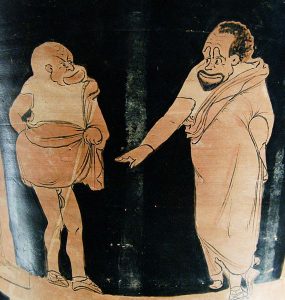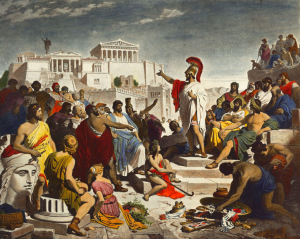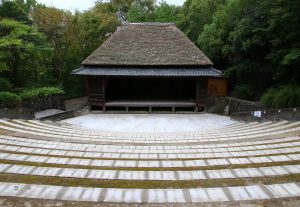Director of the SDGs Future Investment Research Institute, Akira Aoyama interviews Oriza Hirata
Multi-award-winning playwright and director, Professor Oriza Hirata is arguably one of preeminent figures in Japanese theater of this past century. Since establishing his Seinendan theater troupe to further explore his pioneering “contemporary colloquial” genre of naturalistic performance in the early 80s, Hirata’s work has been premiered around the world to rousing acclaim. He has been invited on numerous occasions to collaborate not just with leading performing arts houses overseas but also on interdisciplinary projects including a hybrid human and robot comedy piece with the assistance of leading robotics researcher Dr. Hiroshi Ishiguro.
Needless to say, creative expression through the performing arts is fundamental to our culture and enriches people’s lives, and Hirata has long been an advocate for performing arts education, something he feels has been lacking in Japan.
This is the first instalment of a three-part interview in which we discuss the origins of theater and its coexistence with philosophy and discourse, the role of theater in society, where the enjoyment of theater as both actor and spectator comes from.
The pleasures of theater

© Marie-Lan Nguyen
Akira Aoyama: What gets you excited about theater?
Oriza Hirata: The theatrical styles you see today originated in ancient Greece 2,500 years ago, but actually theater started even earlier. There is evidence of festivals having taken place from very early archaeological remains dating to the Jomon Period (starting the year 14,000 BC). So you could say that for as long as homo sapiens has been around, so has theater.
My theory, in short, is that the origin of theatrical and artistic expression coincided with that of communication. And the need for storytelling probably derived from the way that humans were both part of a family unit and a wider society, and as such had different perspectives on events, whereas other primates like gorillas and chimpanzees belonged to a single community that experienced events in exactly the same way. So you became skilled at using different means to convey to your family just how big that mammoth you saw today was: through physical gestures, through drawing and through words. Then this story would be told again by somebody else. And, because humans always have the urge to convey something in a better or more interesting way, that is where creativity springs from. In that sense theater is one of the most primitive tools that we have.
Secondly, I mentioned that Greek theater emerged at around the same time as democracy. This meant that the decisions previously made by kings and aristocrats were left to the people. Yet, since everyone thinks differently, you had disagreement, and those with more powerful voices would win such debates.
The Greeks did a great service to humanity by leaving us with the tools of philosophy and dialectics in discourse. But theater is inextricable from these things. If philosophy is the way to reconcile different concepts, theater is a means by which that is achieved. At least, that is how I was trained.
In Europe theater thrives and plays a major role as a function of civil society, and for its sustainability. You could say there’s a “system,” rather like going to church, in that people make a habit of going to the theater once a week or once a month, to watch plays, listen to music and so on. Kabuki theater, for example, was once like a rite of passage for children growing up in rural Japan, but unfortunately, the development of traditional theater and performing arts was interrupted during the period of intense modernization the country underwent during the Meiji Period (1868-1912). In that sense, theater requires you to be “literate” and make a conscious effort, because you have so little exposure to it growing up.

I think you would agree that the impact of theater comes from the experience of simply being there, to feel the presence of others. It’s fun to be a spectator.
I don’t know why but sharing a space seems fundamental to us as humans. It’s the same kind of satisfaction that comes when gathering with others around a table to share a meal, compared to simply eating on one’s own.
When internet livestreaming began, there was a misconception that demand for theater tickets would drop. The Metropolitan Opera in New York, for example, has very popular livestreamed events, but these have served to increase demand for their sit-down shows. 90% of livestream spectators who responded to their survey say that they wanted to see the real thing. Even though CD sales in Japan have dropped dramatically in the last 20 years, for example, live entertainment has gone from being a ¥250 billion to a ¥1 trillion industry over that period. And now with the pandemic having stopped these events going ahead, I can only imagine the value attached to live, in-person performances will increase and we can expect ticket prices to go up. And so how to democratize this, and ensure access for all, is another issue.

Theater is also part of child’s play, at home and among friends, yet this is disappearing rapidly.
Of course there are many other things that children can occupy themselves with now. But it was a hot topic in early childhood education at one time, how role playing or “playing house” became impossible with the nuclear family, declining birth rate, the collapse of local community and modern working culture. My experience in theater education is that children love it; they love playing other people. But educators today aren’t trained in theater education. Whereas in Europe, kids are exposed to puppet shows, masked theater…It’s about being able hide oneself and pretend to be someone else. A kind of lie, and a fun one. Again, I think this is a primordial human desire. But there is no doubt that this culture is disappearing.
This text has been adapted from the original Japanese: https://japan-sdgs.or.jp/news/646.html





